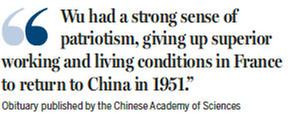Master of mathematics dies at age 98

Wu Wenjun, one of China's top mathematicians, died in Beijing on Sunday morning at the age of 98, according to the Chinese Academy of Sciences.
Wu was presented with a National Top Science and Technology Award, the country's most prestigious award for scientists, in 2000 and in 2006 received the Shaw Prize, named after Hong Kong philanthropist Run Run Shaw. It is widely regarded as the Nobel Prize of the East.
The CAS Academy of Mathematics and Systems Science, where Wu worked as a researcher, published an obituary on its website.

Born in Shanghai on May 12, 1919, Wu graduated from Shanghai Jiao Tong University, a top institution, in 1940. He then went to the University of Strasbourg in France in 1947 to continue his studies. He earned a doctorate in 1949 before beginning his career as a researcher at the National Center for Scientific Research in France.
In 1951, Wu returned to China to work at Peking University. He then transferred to the Academy of Mathematics and Systems Science, and in 1957 was elected an academician of the CAS.
During his decades of research, Wu played an important role in a number of mathematical research institutes and societies, both in China and abroad, such as the Chinese Mathematical Society and the International Congress of Mathematicians.

The CAS said Wu made significant contributions to algebraic topology, a branch of math studies, with the development of the Wu formula, which represented a breakthrough in the field in the 1950s.
He was also recognized as the initiator of mathematics mechanization, which he came up with in the 1970s, using computers to find or help find mathematical proofs.
The CAS said in the obituary that many of Wu's students have gone on to become pioneers or leading figures in their fields, and the key lab on mathematics mechanization that Wu established has become one of the major research centers in the world for symbolic computation.
"He is among the most internationally influential Chinese mathematicians, and his work has had a profound and lasting impact on the research of mathematics and computer science," it said.
"Wu had a strong sense of patriotism, giving up superior working and living conditions in France to return to China in 1951. He had an in-depth understanding of Chinese culture and made significant contributions to its renaissance with his own research," it said.
A memorial ceremony will be held for Wu at Beijing Babaoshan Cemetery on Thursday.
- More aftershocks expected following deadly Xizang earthquake
- HKSAR chief executive mourns victims of Xizang 6.8-magnitude quake
- Milestones in China's high-speed railway development
- All-China Women's Federation raises over 13 million yuan for quake relief in Xizang
- China's lithium reserves rank second in the world
- China Coast Guard patrols around Diaoyu Dao





































